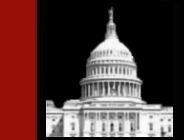Rumsfeld Space Commission
last updated: November 1, 2007
Please note: The Militarist Monitor neither represents nor endorses any of the individuals or groups profiled on this site.

The Commission to Assess United States National Security Space Management and Organization, frequently called the Rumsfeld Space Commission or simply the Space Commission, was established in 1999 by an amendment to the Fiscal Year 2000 Defense Authorization bill. The commission is perhaps most well known for suggesting that unless the United States took threats of space attack seriously, it could not avoid a "Space Pearl Harbor."
Sen. Bob Smith (R-NH) was the point-person in Congress for creating the Space Commission. Explaining the motivation for the commission’s creation, Smith told a Center for Security Policy (CSP) forum, only days before the commission released its report: "The annual [Defense Department] budgets repeatedly shortchange space programs. … People without space background are promoted ahead of space officers, and treaties have negotiated away our space advantage" (CSP, January 9, 2001). At the time, Smith was one of more than a dozen congressional representatives who sat on CSP’s advisory board.
Donald Rumsfeld chaired the Space Commission, which released its report on January 11, 2001. Rumsfeld served on the commission until December 28, 2000—the date George W. Bush nominated him as defense secretary. Rumsfeld’s staff director for the commission was Stephen Cambone, who later became the first-ever undersecretary of defense for intelligence in March 2003, and who was also staff director of the Rumsfeld Missile Commision, a congressionally mandated commission that Rumsfeld chaired in 1998. The Space Commission is often referred to as the second Rumsfeld Commission. Like the first commission, the Space Commission echoed the alarmism about national security threats propagated by right-wing groups such as the CSP.
The commission concluded that it is "possible to project power through and from space in response to events anywhere in the world. … Having this capability would give the United States a much stronger deterrent and, in a conflict, an extraordinary military advantage." The commission argued in Orwellian style that because the United States is without peer among "space-faring" nations, the country is all the more vulnerable to "state and non-state actors hostile to the United States and its interests." In other words, U.S. enemies would seek to destroy the U.S. economy together with its ability to fight high-tech wars by attacking global-positioning satellites and other "space assets," which would effectively result in a "Space Pearl Harbor" (Report of the Rumsfeld Space Commission, Executive Summary, pp. vii-viii).
"We know from history that every medium—air, land, and sea—has seen conflict. Reality indicates that space will be no different. Given this virtual certainty, the United States must develop the means both to deter and to defend against hostile acts in and from space" (Report of the Rumsfeld Space Commission, Executive Summary, p. x).
The 13 members of the commission include several space weapons enthusiasts, military hardliners, and military-industrial complex insiders. Indeed, the commission embodied what William Hartung and Michelle Ciarrocca of World Policy Institute call the "military-industrial-think-tank complex," and of the 13 commissioners, at least eight were consultants or board members for high-tech Pentagon contractors (see "Axis of Influence," World Policy Institute, July 2002). Six commissioners were retired flag officers, including Gen. Ronald Fogleman, who served on the boards of directors of several firms that collectively received more than $900 million in contracts in 2002. When Rumsfeld became Bush’s defense secretary, Fogleman together with fellow Space Commission members Gen. Charles Horner and Adm. David Jeremiah were tapped to serve on the Pentagon’s Defense Policy Board.
Examples of the representation from right-wing think tanks on the commission include three members of the CSP advisory board: Horner, former Republican Sen. Malcolm Wallop of Wyoming (who was a Heritage Foundation senior fellow), and the military-industrial insider William Graham. The Jewish Institute for National Security Affairs was represented by two close associates, Jeremiah and Lt. Gen. Jay Garner. Other right-wing think tanks whose associates were on the commission included the National Institute for Public Policy, and Frontiers of Freedom.
Commenting on the two Rumsfeld commissions, Theresa Hitchens, vice president of the Center for Defense Information, said they were "part of the same tradition as some of Team B" due to their strategy of undermining official threat assessments. Summarizing the Rumsfeld commissions’ results, Hitchens said: "One of the striking things about the reports from both commissions was that threats were no longer being assessed on the basis of what people were currently capable of doing, or capable of doing in the near future, but of what they could potentially be capable of. And there was no thought about intent. You know a threat is defined as being based on capabilities, intent, and ability to implement. The last two have been thrown out the window, and the first one is totally perverted by both these commissions. And I find that to be totally weird. This sort of paranoia thing … is wacky because then everything can be a threat" (Flynn interview, June 12, 2003).
